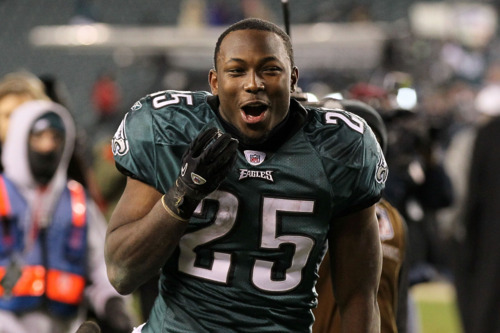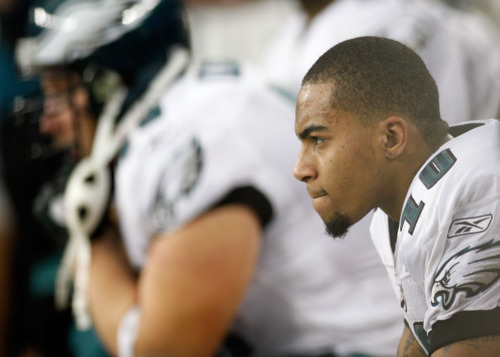I’ve opined before on giving Dominique Rodgers-Cromartie a contract extension, going as far as to call it an offseason priority. With Nnamdi Asomugha aging and only unproven recent draftees behind him, locking up Rodgers-Cromartie would go a long way to preserve continuity in the defensive backfield. Obviously, whether you want to extend him also stems from your impression of him as a player. If you’ve been following along, you know that I think DRC’s stellar play on the outside at the end of 2011 after he languished in the slot for most of the year suggests big things could be in store for him. (And reports out of training camp are stellar so far.)
But unless Howie Roseman is discussing things behind the scenes during training camp, it doesn’t look like he agrees, with either Rodgers-Cromartie’s value or his skill. Let’s go deeper and see what the difference in money might be based on letting DRC play out this contract year. Here’s a table of recent top cornerback contracts given out for players in his age range. Financial details are on the right and on the field stats are on the left (Pro Bowl appearances, games started, yards per attempt, interceptions):
Looking at the finances first, you can see there are different measures for large contracts. The total millions is a nice overall number, although it tends to overstate the “real” value of the deal (with fake years at the end). The yearly figure and guarantee may give a more accurate accounting of the contract.
It’s interesting to look at how the deals were structured and how they turned out. DeAngelo Hall and Dunta Robinson got massive contracts that turned out to be bad for their teams—although you can see why the Redskins and Falcons, respectively, were willing to dish out that kind of dough. For example, Hall was young, even for this group, and already had two Pro Bowl appearances and 22 interceptions.
The following year, Antonio “Headcase” Cromartie received a smaller contract than his number stats warranted because of his off the field problems. Leon Hall got a slightly larger and slightly longer deal. Johnathan Joseph made out like a bandit, with nearly $10 million a year and $24 million guaranteed.
This offseason, Brandon Carr and Cortland Finnegan both just bested Joseph’s contract. Eric Wright has had an up-and-down career, most recently in Detroit, and he signed a more modest five-year free agent deal. Meanwhile, Lardarius Webb, who had a stellar 2011 season with the Ravens, got the largest total amount. That figure is inflated by an extra year though; as you can see the guarantee is less than some of his peers.
So, where does Rodgers-Cromartie fit in? At 26 years old, he has fewer games started than anyone other than Webb, although his other stats are better than average. He has a low yards per attempt figure and a high interception rate. Even with his atrocious play in the slot last season, 2011 was much more in line with his first two seasons in the league. DRC’s 2010 letdown that prompted him to be traded might have been an outlier.
The question becomes what Rodgers-Cromartie would command in today’s market. Given his perceived inconsistency, lack of physicality, and a deficit of experience compare to his peers, DRC probably wouldn’t be in line for a Carr or Cortland-sized contract. Wright’s deal this year and Hall’s in 2011 look like better comparables: perhaps 5 years, $40 million, $16 million guaranteed.
Let’s say though, that Rodgers-Cromartie plays out this season, putting up his career averages, and enters the market in 2012. At that point, with 60 games started, 7.2 yards per attempt against, and 16 or so interceptions, he could make the case that he’s better than Carr or Finnegan. DRC would probably received $25 million guaranteed and upwards of $10 million per year on the open market—a substantial upgrade from his current value.
By not re-signing his second cornerback now, Roseman risks the price going up next year. He may be making one of a few calculated bets, though. Perhaps he thinks DRC simply isn’t worth a long term contract. He’s betting that Rodger-Cromartie will show that he’s not worth top money. Or Howie’s looking at the other backups and assuming that someone like Curtis Marsh will be able to slide in a year from now. Or maybe Roseman is willing to use the franchise tag (at enormous one-year cost) as necessary to keep DRC on hand in 2013.
Looking at the state of the defensive backfield and the market for cornerbacks as it stands now, I would buy into DRC long term. The potential rewards, both financially and on the field, are great, and the downside to not paying him could be severe next offseason. Get it done.
Photo from Getty.





